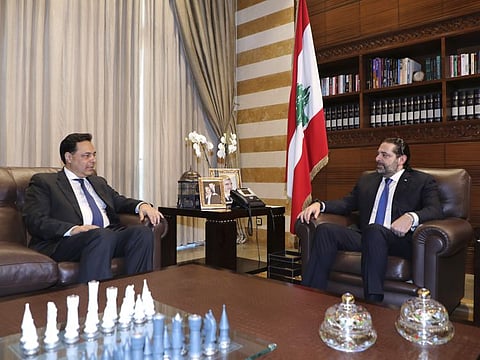Lebanon’s new PM says he plans a government of experts
Diab lacks support of major Sunni figures but says meeting with Hariri was “positive”

Also In This Package
Beirut: Lebanon’s newly designated prime minister said on Friday that he plans to form a government of experts and independents to deal with the country’s crippling economic crisis.
Hassan Diab spoke to reporters following a meeting with former Prime Minister Saad Hariri, a day after he was asked by the president to form the country’s next government.
Diab, a university professor and former education minister, won a majority of lawmakers’ votes after receiving backing from the powerful Shiite Muslim group Hezbollah and its allies.
Lacks Sunni support
However, he lacks the support of major Sunni figures, including the largest Sunni party headed by Hariri.
That is particularly problematic for Diab, who as a Sunni, lacks support from his own community. And under Lebanon’s sectarian power-sharing agreement, the prime minister must be Sunni.
Diab, however, emerged from Friday’s meeting with Hariri saying the atmosphere was “positive.”
“As an expert and an independent, my inclination is to form a government that is truly made up of experts and independents” Diab said.
Shortly after he spoke, scuffles broke out between Hariri’s supporters protesting on a Beirut street and Lebanese army units, underlying the tension on the ground.
Protesters reject Diab
The protesters briefly blocked a main highway in central Beirut, expressing their rejection of Diab.
The protesters brought a truck full of sand and rocks to build a roadblock, at which point the army interfered to remove the protesters and the truck.
A short scuffle ensued, with soldiers pushing and shoving angry protesters. At one point, soldiers kicked one man and another was injured, apparently by police hitting him on the head with a baton.
“I ask them (protesters) to give us a chance to form an exceptional government” that can work on resolving the country’s many problems, accumulated over the past 30 years, Diab said.
Diab faces a huge challenges in trying to form a consensual government that would also satisfy protesters who have been on the streets since mid-October, seeking to sweep away an entire political class they deem as corrupt.
He also faces a mammoth task of dealing with the country’s economic and financial crisis in one of the most indebted countries of the world.
Thorny path
Support from the Iran-backed Hezbollah guarantees Diab a thorny path, potentially inviting criticism from Western and Gulf nations that had supported Hariri. The Shiite group is designated a terrorist organization by the U.S., some Gulf Arab countries and a few Latin American nations.
U.S. Undersecretary of State for Political Affairs David Hale, on a visit Friday to Beirut, did not directly comment on Diab’s appointment, saying only that the United States “has no role in saying who should lead” a Cabinet in Lebanon or anywhere else.
“I’m here to encourage Lebanon’s political leaders to commit to, and undertake, meaningful, sustained reforms that can lead to a stable, prosperous and secure Lebanon,” he said after meeting with Michel Aoun.
“It’s time to put aside partisan interests and act in the national interest, advancing reforms and forming a government that is committed to undertaking those reforms and capable of doing so.”
Hale is the most senior foreign diplomat to visit the country since mass protests erupted in mid-October. The sustained, leaderless protests forced Hariri’s resignation within days but politicians were later unable to agree on a new prime minister. The ongoing protests and paralysis meanwhile worsened the economic crisis.
Friendly nations, including France, have made clear they will not support the heavily indebted nation before a reform-minded Cabinet is formed.
Sign up for the Daily Briefing
Get the latest news and updates straight to your inbox




